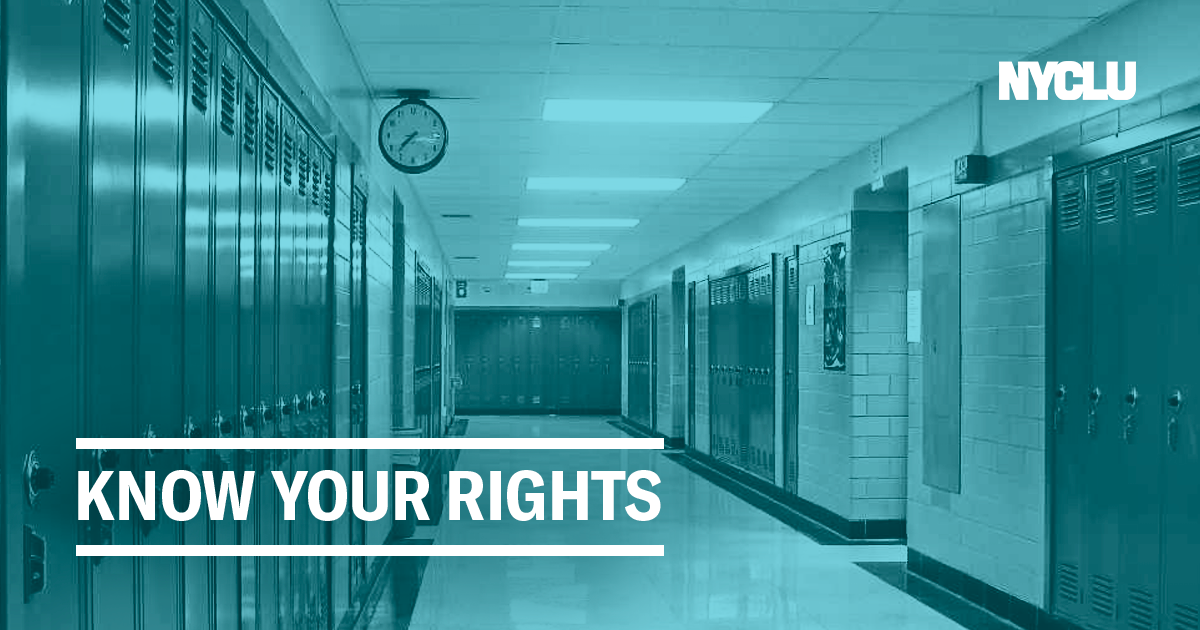Know Your Rights: Students in Higher Education & the First Amendment
Civil Liberties Union

In New York State, everyone younger than 21 who does not have a high school diploma has the right to attend a public school. This right is protected by our state constitution. When your school wants to suspend you, it is taking away that right for a period of time. But there are rules that the school must follow where your rights are concerned.
This guide will help you understand the rules, and protect your right to an education.
This KYR is not a replacement for legal advice.
The “notice” is a letter explaining why you are facing suspension. It must be express mailed or hand-delivered to your parent or guardian right away. You can only be suspended for breaking a rule that is explained in your school’s code of conduct or discipline code. Ask your principal for your code of conduct or discipline code, or search your school’s website.
Short-Term Suspensions: The notice must be received within 24 hours of the decision to suspend you
Long-Term Suspensions: When possible, the school should call your parent or guardian too, but a
phone call alone isn’t enough.
A Suspension Notice Must Include:
* If you were also arrested in school, be sure to share the notice with your criminal attorney.
The notice should be in the dominant language of the parent or guardian. If the school does not include these requirements in the notice you receive, you might be able to appeal.
Your suspension hearing or conference is your only opportunity to tell your side of the story and you MUST attend if you want the chance to change the school’s decision. You can ask your principal for a different consequence instead of a suspension. However, they do not have to give it to you. If you were also arrested in school, speak to your criminal attorney before you ask for a conference or attend a hearing.
Short-Term Suspensions:
You Have the Right to Request a Conference with Your Principal – You must ask your principal for this conference–It is not automatic. If your principal rejects this request for a conference, you may be able to appeal.
You Have the Right to:
After the Conference – The principal will issue a decision about the suspension. The principal may dismiss the suspension or suspend you for one to five school days.
Long-Term Suspensions:
You Have the Right to a Hearing – This is an automatic hearing and will occur even if you
don’t go.
You Have the Right to:
After the Hearing – The hearing officer will decide if the school has proven the charges against you and issue a decision. When the hearing is over, you can ask for a record of the hearing that you may use later if you want to appeal the decision.
If you lose at your suspension hearing or conference, you have the right to appeal your suspension. Appealing means asking a higher level authority (usually your school board) to reconsider your case. You must file your appeal within 30 days. Check your school’s handbook or code of conduct to make sure there is not a shorter deadline. The decision should tell you how to appeal and who to send it to. If not, read your code of conduct or school’s handbook or contact the school board.
When Can You Appeal a Suspension?
Anyone can appeal a suspension. Many suspensions are overturned on appeal because the school didn’t follow the rules when suspending a student. If you are 17 years old or younger, while you are suspended, your school must provide you with “alternative instruction” so you can stay on track.
Common Grounds for Appeal:
Reasons to Appeal: